When the “Barcelona Process” was launched 30 years ago, it was met with high hopes for its economic and social impact and its potential to resolve conflicts in the Mediterranean basin. However, these expectations have largely gone unfulfilled. The initiative put forward in 2008 by then-French President Nicolas Sarkozy to take the process one step forward and create a “Mediterranean Union” was immediately met with reservations by Germany and other European nations, which forced amendments that changed its purpose. They pressured the Mediterranean countries—primarily due to financial considerations—to maintain the institutional partnership with the European Union (and its funding), leading to what became known as the “Union for the Mediterranean.” Despite the financial benefits, this association with the EU, along with the role assigned to the Arab League, diminished the prospects for the emergence of a Mediterranean political identity. Although the institutional framework of the UfM still exists—and for several years even included an Israeli Deputy Secretary General—its impact has been underwhelming, overshadowed by budgetary crises (particularly in Greece), unresolved regional conflicts (‘South vs. South’), and a shift in European focus toward Ukraine.
Now, there are signs of revived interest—at least in Brussels—in the future of the Mediterranean partnership. The EU has appointed, for the first time, a Commissioner for the Mediterranean—Dubravka Šuica, a Croatian former mayor of Dubrovnik, who is heading the EU effort to finalize a new “Mediterranean Pact,” scheduled for presentation in October 2025 that will replace the original Barcelona document. Israel must ensure that, even during this turbulent time, it engages with the relevant EU institutional structures to ensure its presence and interests are taken into account in the newly revived framework. Israel brings to the table a strong relationship with Greece and Cyprus, as well as an active role in a regional partnership that can be expanded—namely, the Eastern Mediterranean Gas Forum (EMGF). In terms of identity and cultural association, belonging to a multi-faceted Mediterranean “mosaic” is preferable to a reality of relative isolation within Arab and Islamic circles.
Historical Background
A number of writers and intellectuals, including Taha Hussein in Egypt, Albert Camus—an Algerian-born Frenchman—and the Egyptian-born Israeli Jacqueline Kahanoff, addressed decades ago the question of the cultural and political aspects that, at least in theory, link the nations of the Mediterranean basin. However, the first serious effort to translate these ideas into diplomatic language and administrative structure emerged only in the mid-1990s, against the backdrop of the end of the Cold War, the defeat of Saddam Hussein, the onset of Arab-Israeli negotiations (both bilateral and multilateral), and the Oslo Accords.
These developments, coupled with the push by Southern European nations for a strategic role in parallel with EU and NATO expansion eastward led to the establishment of the Barcelona Process framework (officially known as the Euro-Mediterranean Partnership Process) at the initiative of the EU. This framework was launched at the level of Foreign Ministers in November 1995. In Israel, the event received little attention due to the recent impact of the assassination of Prime Minister Yitzhak Rabin on November 4. Nevertheless, it marked the first meeting of its kind in which Israel participated as a regional player, an equal among equals, alongside Arab countries, including Syria and Lebanon (with only Libya, still under sanctions, absent).
The Barcelona Process was expected, in line with previous models of rapprochement between East and West, to include three “baskets” of activities:
- A diplomacy and security basket aimed at promoting peace agreements and reducing tensions among regional players.
- An economic basket primarily consisting of European assistance for infrastructure projects in the “South” (and Eastern) Mediterranean countries.
- A cultural and social basket designed to promote people-to-people relations.
In practice, many of the hopes that accompanied the launch of the process, given what seemed to be a promising reality in 1995, were shattered by the crisis conditions which engulfed the Arab-Israeli peace process. These included the failure of negotiations with Syria, which collapsed in March 2000, and the outbreak of Palestinian violence in the autumn of that same year following the unsuccessful Camp David summit. Tensions on other fronts, such as the ongoing disputes between Algeria and Morocco, also contributed to the challenges faced. In all three baskets, progress was slow and limited, and European attention began shifting to eastward expansion and the Balkan wars.
Nevertheless, during his successful election campaign in 2007 and later as President of France, Nicolas Sarkozy—who has part Greek Jewish heritage—sought to advance Mediterranean integration. Some in Ankara at the time suggested this was a way to provide an alternative to Turkey’s accession to the EU, which France opposed. Additionally, it was an opportunity to create a new community in which France would play a central role. Sarkozy coined the term “Mediterranean Union,” presumably designed to emerge in parallel to, but separate from, the EU.
However, a number of European countries, led by Angela Merkel’s Germany, raised objections. Their concerns stemmed from either a reluctance to see a new entity emerge under French leadership or a desire to involve wealthy non-coastal European nations in Mediterranean affairs. As a result, Sarkozy was compelled to accept a modified version— the Union for the Mediterranean (UfM) — in which all Mediterranean nations collectively, as well as the Arab League, are members, along with all members of the EU: thus Finland, and for that matter Oman, are part of the UfM.
The new organization was launched at a highly visible gathering in Paris in June 2008, attended by heads of state and government, including, remarkably, both Israeli Prime Minister Ehud Olmert and Syrian President Bashar al-Assad. It was to be managed by a permanent secretariat, established in 2010 at the Palau de Pedralbes in Barcelona.
The presidency is shared between the “north” (France until 2012, and since then the EU) and the “south” (Egypt until 2012, and Jordan since then). The Secretary-General is always from the (Arab) south – initially a Jordanian, Ahmad Khalaf Masa’adeh; followed by Moroccan diplomats Youssef Amrani and Fathallah Sijilmassi from 2011 to 2018; and since 2018, Ambassador Nasser Kamel, an Egyptian diplomat. For the first few years the Deputy Secretary General for Research and Higher Education was a distinguished Israel agronomist, Professor Ilan Heth, formerly President of the Weizmann Institute. However, after his term ended, no Israelis held key positions in the UfM.
Once again, the high hopes raised at the time did not materialize. Nevertheless, the UfM persists to this day. Its re-definition as an adjunct of the EU system constrained the emergence of a specific Mediterranean political and cultural identity. Resources were initially limited by the huge sums invested by Europe to rescue the Greek economy and others in Southern Europe from the financial crisis. Additionally, tensions among southern partners, including the waning of Israeli-Palestinian peace efforts, further complicated matters. Moreover, since 2022, European focus has shifted to the war in Ukraine and its strategic implications.
Renewed Interest in the Mediterranean Partnership
Despite these disappointments, there has been a guarded revival of European interest in relations with “the south” over the last year. This resurgence is largely driven by the migration challenge and its domestic reverberations, which have become major factors in the political life of many member states, contributing to the rise of parties like “Reform” in Britain, AfD in Germany, and the PVV in the Netherlands. Energy supply considerations have also played a role. Moreover, key players in southern Europe—with Italy more active than before— seek to balance the eastward tilt and address the issue of accession in the Balkans by building bridges to the southern shores of the Mediterranean.
This renewed burst of activity is reflected in two interrelated initiatives:
- The appointment, for the first time ever, of a High Commissioner for the Mediterranean, Dubravka Šuica from Croatia, who took office on December 1, 2024. Šuica previously served two terms as the mayor of the Adriatic port town of Dubrovnik from 2001 to 2009, becoming the first woman to hold that position. She later became a Member of the European Parliament. It is worth noting that Croatia, to enhance its appeal to tourists, promotes its Mediterranean identity, encapsulated in the phrase “The Mediterranean as it once was,” to distance itself from the Balkan conflicts and the wars that tore the region apart in the 1990s. In her public statements, Šuica has underscored the Mediterranean’s significance as a hub for critical issues concerning the future of Europe: security, migration, and energy.
- The formulation of a new text, currently in final discussions, aims to redefine relations with Mediterranean basin countries and the UfM. This “New Pact for the Mediterranean” is scheduled to be rolled out in October 2025 and will focus on four main areas:
- Security, including countering terrorism and crime, while seeking to advance de-radicalization;
- Economic cooperation, with an emphasis on investment in infrastructure;
- Addressing the climate crisis, which poses a devastating threat to the Mediterranean—a largely enclosed body of water;
- Creating conditions for “people-to-people” interactions to reduce migration pressures by making the southern regions more livable.
What This May Mean for Israel
Integration within a broad Mediterranean alignment is an Israeli strategic interest, both directly—in diplomatic and security matters, and economically—and indirectly, as it offers key players such as Egypt and Morocco, as well as the “new” Syria and Lebanon, provided they evolve in a constructive direction, a framework for identity and action (shared by Israel) that is neither pan-Arab nor pan-Islamic. This context explains Israel’s support for the Barcelona Process in 1995 and again for Sarkozy’s vision in 2008.
At this juncture—confronted with an openly hostile Spanish position, French recognition of a Palestinian state, Italy’s surprising shift under Meloni’s leadership toward Turkey’s stance on EEZ delineation in the Eastern Mediterranean, and the increasingly critical attitudes of traditional allies such as Germany and the Netherlands—there are valid reasons to doubt the prospect of Israel being warmly welcomed in the context of renewed European activism.
Nonetheless, it is important that Israel take all possible steps to find its place in the UfM—including detailed preparatory steps by the Ministry of Foreign Affairs, the Ministry of Regional Cooperation (which is formally responsible for managing Mediterranean affairs), and other governmental agencies coordinated by the National Security Council (MALAL). Israel comes to the discussion table on the future of the Mediterranean basin with well-defined goals, including trade, energy, joint infrastructure projects and the legitimization of its regional role.It also brings its own assets to the table, which can shape the discourse with the powers that be in Europe:
- Despite bitter disputes over the Palestinian question, there are profound commonalities on vital issues such as Iran, as reflected in the European position on Iran and the “snapback” of sanctions against Tehran. Specifically regarding the Mediterranean, there is a shared concern for the future of Syria and Lebanon, which Europe also wishes to see move in a more stable and peaceful direction.
- Israel shares with Europe—again, despite deep dissatisfaction with the conduct of the war—the goal of de-radicalization in the region, specifically confronting Islamist totalitarianism. Even those who took measures that Israel resented acknowledged in the same breath that Hamas must not be allowed to maintain power in Gaza.
- Israel has maintained a close partnership with Greece and Cyprus, despite discordant voices in the streets of Athens and elsewhere. This partnership reflects, among other factors, the general European need to curb Erdoğan’s neo-Ottoman ambitions.
- Israel plays a valuable role in the one functional regional framework, the Eastern Mediterranean Gas Forum (EMGF), the significance of which was recently demonstrated by the huge gas deal between Israel and Egypt.
- Israel may still be able to influence the U.S. position, particularly in Congress, regarding the new framework. So far, Washington has shown scant interest in the Mediterranean, other than as a Sea Lane of Communication (SLOC), and the efforts to re-create it as a political community. To illustrate that point, it has not appointed a diplomat to the UfM.
These tools can and should be leveraged to ensure that, despite European dismay over the conduct of the war in Gaza, Israel will be able to use the new initiative to counter efforts to isolate it. After all, the integration of the Mediterranean cannot be complete unless Israel remains a legitimate partner in shaping the region’s future.
JISS Policy Papers are published through the generosity of the Greg Rosshandler Family.















Disarm Hamas or Face a Partitioned Gaza